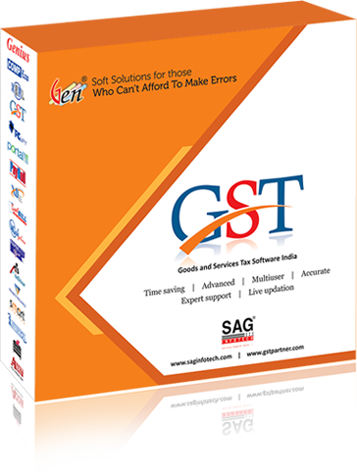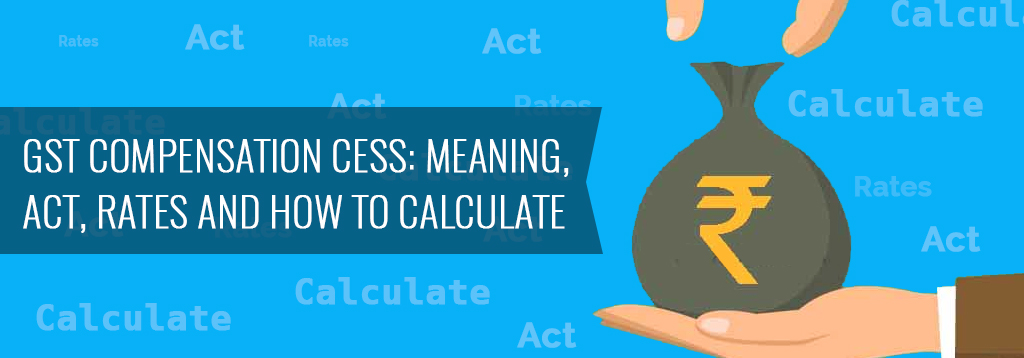In this article, you will find answers to all your questions about cess in GST like the meaning of GST cess, act, rates and how to calculate Compensation Cess in GST.
GST Cess is a special tax that is levied as compensation on the value of supply in addition to the GST tax. Although most of the cess taxes including swachh bharat cess and krishi kalyan cess were removed after the launch of GST, there is still cess applicable on some specific products and services.
Contents
What is GST Cess
Cess under GST is a compensation cess that will be levied on certain goods and services under section 8 of the GST Act, 2017. It is levied on interstate and intrastate transactions of goods and services to compensate the revenue losses occurred to the States because of the implementation of GST in the country.
After the implementation of GST, only the states where the actual consumption of goods takes place will receive the indirect tax revenue. This results in a revenue loss for the states whose revenue mainly comes from the export of goods and/or services. To compensate this loss of revenue, the government has made an act under which a GST compensation cess would be charged on some specific items for a period of 5 years, after which it will be removed completely.
Goods and Services Tax (Compensation to State) Act, 2017
According to the GST cess (Compensation to State) Act, 2017, a compensation cess would be levied on specific items and services for compensation to the States for the loss of revenue on account of implementation of the goods and services tax in pursuance of the provisions of the Constitution (One Hundred and First Amendment) Act, 2016.
Refer the official GST cess Act Law pdf attached above for complete details and rules of the act.
GST cess levied this way would be credited to the GST compensation fund, from where it will be used to compensate the tax revenue losses of the States caused by GST implementation. The unutilized funds, if any, would be distributed among the Centre and the States equally. The state governments would receive cess in the ratio of the indirect tax revenues generated by them in the last year before the implementation of GST.
GST Compensation Cess Calculation
The GST cess on an eligible product will be calculated according to the rate specified in the GST cess rate schedule and on the actual taxable value (transaction value) of the supply, not on the GST tax (unlike the previous tax system).
For cess applicable imports, the GST cess amount will be calculated on the taxable value + customs duty, i.e. the same value on which IGST is levied. Let’s understand this with an example.
Suppose that you are buying a Petrol Car on which applicable GST rate is 28% and GST Cess rate is 1%
The value of car is Rs. 5 Lacs
CGST 14% = 70,000
SGST 14% = 70,000
Cess 1% = 1% of 5 lac = 5,000
Final value of the car = 6,45,000INR
GST Cess Applicable Goods/Services with Rate List
GST cess would be applicable on all interstate and intra-state transactions of the goods and services as specified by the Central Government. Cess is liable on some specific products such as Pan Masala, Tobacco, coal, cigarettes, vehicles, aerated waters and motor cars etc. The GST Council may increase the GST cess on luxury cars in the next meeting to raise funds to help Kerala flood affected states.
GST Cess applicable goods with cess rates list
-> The GST cess rate schedule for applicable goods was officially released on 28th June 2017.
GST Cess applicable services with cess rates list
-> The GST Compensation Cess will also be applicable to the supply of the following services.
| Sl. No. | Description of Services | Chapter, Section, Heading or Group | Rate (in per-cent.) |
| 1 | Transfer of the right to use any goods for any purpose (whether or not for a specified period) for cash, deferred payment or other valuable consideration | Chapter 99 | Same rate of cess as applicable on supply of similar goods involving transfer of title in goods |
| 2 | Transfer of right in goods or of undivided share in goods without the transfer of title thereof | Chapter 99 | Same rate of cess as applicable on supply of similar goods involving transfer of title in goods |
| 3 | Any other supply of services | Chapter 99 | Nil |
-> As per a notification released on 30th June 2017, the following changes will be made in the official GST cess rate schedule.
(i) in line 42, for “8702 10”, read “8702 10, 8702 20, 8702 30, 8702 90”;
(ii) in line 42, for “ten or more”, read “not more than 13”.
-> The following amendments were made by the Central Government in the cess rate schedule through a notification released on 18th July, 2017.
(i) against S. No. 10, for the entry in column (4), the entry “5% + Rs. 2076 per thousand” shall be substituted;
(ii) against S. No. 11, for the entry in column (4), the entry “5%+ Rs. 3668 per thousand” shall be substituted;
(iii) against S. No. 12, for the entry in column (4), the entry “5% + Rs. 2076 per thousand” shall be substituted.
(iv) against S. No. 13, for the entry in column (4), the entry “5% + Rs. 2747 per thousand” shall be substituted;
(v) against S. No. 14, for the entry in column (4), the entry “5% + Rs. 3668 per thousand” shall be substituted;
(vi) against S. No. 15, for the entry in column (4), the entry “36% + Rs. 4170 per thousand” shall be substituted.
-> In a separate notification released by the government on 20th July, 2017, it was decided that the intra-State supplies of second hand goods received by a registered person, dealing in buying and selling of second hand goods and who pays the GST compensation cess on the value of outward supply of such second hand goods, from a non-registered supplier, will be exempted from the whole of the goods and services tax compensation cess leviable thereon under section 8 of the Goods and Services Tax (Compensation to States) Act.
Other Important Things to Know about GST Compensation Cess Act, 2017
- GST Cess can be collected by any taxable person on the supply of cess liable goods (except composition registered taxpayers).
- Input credit (ITC) can be levied on cess paid on inward supplies and it can only be used to pay the cess liability.
- The Cess will always be calculated on the transaction value of the goods/services.
GST Cess Rate List:
|
Name of Product |
HSN Code |
GST Cess |
|
Pan Masala |
2106-90-20 |
60% |
Tabacco and Related Products
|
Unmanufactured Tobacco (with lime tube) – bearing a brand name |
2401 |
71% |
|
Unmanufactured Tobacco (without lime tube) – bearing a brand name |
2401 |
65% |
|
Pan masala containing tobacco ‘Gutkha’ |
36 |
204% |
|
Jarda scented tobacco |
2403-99-30 |
160% |
|
Filter Khaini |
2403-99-10 |
160% |
|
Chewing tobacco (with lime tube) |
2403-99-10 |
142% |
|
Chewing tobacco (without lime tube) |
2403-99-10 |
160% |
|
Tabacco refuse, bearing a brand name |
2401-30-00 |
61% |
|
Cigar and cheroots |
2402-10-10 |
21% or Rs. 4170 per thousand, whichever is higher |
|
Cigarettes containing tobacco other than filter cigarettes, of length, not exceeding 65 millimetres |
2402-20-10 |
5% + Rs. 2076 per thousand |
|
Cigarettes containing tobacco other than filter cigarettes, of length, not exceeding 65 millimetres but not exceeding 75 milimetres |
2402-20-20 |
5% + Rs. 3668 per thousand |
|
Filter cigarettes of length (including the length of the filter, the length of filter being 11 millimetres or its actual length, whichever is more) not exceeding 65 millimetres |
2402-20-30 |
5% + Rs. 2076 per thousand |
|
Filter cigarettes of length (including the length of the filter, the length of filter being 11 millimetres or its actual length, whichever is more) exceeding 65 millimetres but not exceeding 70 millimetres |
2402-20-40 |
5% + Rs. 2047 per thousand |
|
Other cigarettes containing tobacco |
2402-20-90 |
36% + Rs. 4170 per thousand |
|
Cigarettes of tobacco substitutes |
2402-20-10 |
Rs.4006 per thousand |
|
Hookah’ or ‘gudaku’ tobacco bearing a brand name |
2403-11-10 |
72% |
|
Tobacco used for smoking ‘hookah’ or ‘chilam’ commonly known as ‘hookah’ tobacco or ‘gudaku’ not bearing a brand name |
2403-11-10 |
17% |
|
Smoking mixtures for pipes and cigarettes |
2403-19-10 |
290% |
|
Other water pipe smoking tobacco not bearing a brand name. |
2403-11-90 |
11% |
|
“Homogenised” or “reconstituted” tobacco, bearing a brand name |
2403-91-00 |
72% |
|
Snuff |
2403-99-50 |
72% |
Vehicles
|
Petrol, Liquefied petroleum gases (LPG) or compressed natural gas (CNG) driven motor vehicles of engine capacity not exceeding 1200cc and of length not exceeding 4000 mm |
8703-21 / 8703-22 |
1% |
|
Motor vehicles for the transport of not more than 13 persons, including the driver |
8702-10/8702-20/8702-30/8702-90 |
15% |
|
Motor vehicles of engine capacity not exceeding 1500cc |
8703 |
17% |
|
Motor vehicles of engine capacity exceeding 1500cc |
8703 |
20% |
|
Diesel driven motor vehicles of engine capacity not exceeding 1500 cc and of length not exceeding 4000 mm |
8703-31 |
3% |
|
Motor vehicles of engine capacity exceeding 1500 cc, popularly known as Sports Utility Vehicles (SUVs) including utility vehicles |
8703-31 |
22% |
|
Motorcycles of engine capacity exceeding 350 cc. |
8711 |
3% |
Minerals
|
Coal; briquettes, ovoids and similar solid fuels manufactured from coal |
2701 |
Rs.400 per tonne |
|
Lignite, whether or not agglomerated, excluding jet |
2702 |
Rs.400 per tonne |
|
Peat (including peat litter), whether or not agglomerated |
2703 |
Rs.400 per tonne |







GST Cess can be collected by any taxable person on the supply of cess liable goods (except composition registered taxpayers).
We purchased material (dolochar/charcoal/Ash & residues) from Manufacturing unit and they charging Compensation Cess of Rs.400/- Per Metric Ton. (They are collecting from us).
And we are re-selling the same material to another customer.
Now my question is ” Is it my necessary to collect the Cess amount from customer”?
waiting for reply… thanking you
All taxpayers under GST except composition scheme are required to collect and remit GST cess to govt. on goods and services.